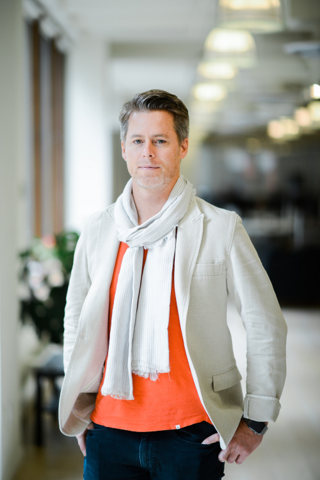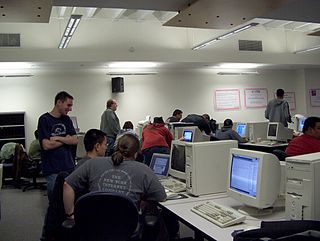
Plan 9 from Bell Labs is a distributed operating system which originated from the Computing Science Research Center (CSRC) at Bell Labs in the mid-1980s and built on UNIX concepts first developed there in the late 1960s. Since 2000, Plan 9 has been free and open-source. The final official release was in early 2015.

Sun Microsystems, Inc. was an American technology company that sold computers, computer components, software, and information technology services and created the Java programming language, the Solaris operating system, ZFS, the Network File System (NFS), and SPARC microprocessors. Sun contributed significantly to the evolution of several key computing technologies, among them Unix, RISC processors, thin client computing, and virtualized computing. Notable Sun acquisitions include Cray Business Systems Division, Storagetek, and Innotek GmbH, creators of VirtualBox. Sun was founded on February 24, 1982. At its height, the Sun headquarters were in Santa Clara, California, on the former west campus of the Agnews Developmental Center.

The University of California, Berkeley is a public land-grant research university in Berkeley, California. Founded in 1868 and named after the Anglo-Irish philosopher George Berkeley, it is the state's first land-grant university and is the founding campus of the University of California system.

Solaris is a proprietary Unix operating system originally developed by Sun Microsystems. After the Sun acquisition by Oracle in 2010, it was renamed Oracle Solaris.
UNICOS is a range of Unix and later Linux operating system (OS) variants developed by Cray for its supercomputers. UNICOS is the successor of the Cray Operating System (COS). It provides network clustering and source code compatibility layers for some other Unixes. UNICOS was originally introduced in 1985 with the Cray-2 system and later ported to other Cray models. The original UNICOS was based on UNIX System V Release 2, and had many Berkeley Software Distribution (BSD) features added to it.

Project Athena was a joint project of MIT, Digital Equipment Corporation, and IBM to produce a campus-wide distributed computing environment for educational use. It was launched in 1983, and research and development ran until June 30, 1991. As of 2023, Athena is still in production use at MIT. It works as software that makes a machine a thin client, that will download educational applications from the MIT servers on demand.

Spencer Kimball is an American computer programmer, entrepreneur, and business executive. He is the CEO of Cockroach Labs, a company he co-founded in 2014. His work as a programmer includes creating GNU Image Manipulation Program (GIMP) while still in college, and assisting the source code development of CockroachDB, the namesake software of Cockroach Labs. In addition to Cockroach Labs, Kimball was involved in the founding of other tech startups including WeGo and Viewfinder.
CFEngine is a configuration management system, written by Mark Burgess. Its primary function is to provide automated configuration and maintenance of large-scale computer systems, including the unified management of servers, desktops, consumer and industrial devices, embedded network devices, mobile smartphones, and tablet computers.

Jon "maddog" Hall is the board chair for the Linux Professional Institute.

Carnegie Mellon Silicon Valley is a degree-granting branch campus of Carnegie Mellon University located in Mountain View, California. It was established in 2002 at the NASA Ames Research Center in Moffett Field.

Evans Hall is the statistics, economics, and mathematics building on the campus of the University of California, Berkeley.
Jiangsu Lemote Tech Co., Ltd or Lemote is a computer company established as a joint venture between the Jiangsu Menglan Group and the Chinese Institute of Computing Technology, involved in computer hardware and software products, services, and projects.

A Linux User Group or Linux Users' Group (LUG) or GNU/Linux User Group (GLUG) is a private, generally non-profit or not-for-profit organization that provides support and/or education for Linux users, particularly for inexperienced users. The term commonly refers to local groups that meet in person but is also used to refer to online support groups that may have members spread over a very wide area and that do not organize, or are not dependent on, physical meetings. Many LUGs encompass FreeBSD and other free-software / open source Unix-based operating systems.

A Unix-like operating system is one that behaves in a manner similar to a Unix system, although not necessarily conforming to or being certified to any version of the Single UNIX Specification. A Unix-like application is one that behaves like the corresponding Unix command or shell. Although there are general philosophies for Unix design, there is no technical standard defining the term, and opinions can differ about the degree to which a particular operating system or application is Unix-like.

Unix is a family of multitasking, multi-user computer operating systems that derive from the original AT&T Unix, whose development started in 1969 at the Bell Labs research center by Ken Thompson, Dennis Ritchie, and others.

Government Engineering College, Kozhikode (GECK), is a public engineering institute established by the Department of Technical Education under the Government of Kerala in India. It was one of the five public engineering institutes sanctioned in 1999 by the Government of Kerala. It is one of the 138 institutes affiliated to the APJ Abdul Kalam Technological University since 2015.
The OpenBSD Cryptographic Framework (OCF) is a service virtualization layer for the uniform management of cryptographic hardware by an operating system. It is part of the OpenBSD Project, having been included in the operating system since OpenBSD 2.8. Like other OpenBSD projects such as OpenSSH, it has been ported to other systems based on Berkeley Unix such as FreeBSD and NetBSD, and to Solaris and Linux. One of the Linux ports is supported by Intel for use with its proprietary cryptographic software and hardware to provide hardware-accelerated SSL encryption for the open source Apache HTTP Server.
Mark Bolzern is one of the original pioneers of both the Internet, and of the Linux computer operating system. Bolzern was the founder of early Linux-specific community portals such as LinuxNews, LinuxMall, LinuxPro, LinuxGuru and PenguinPower. Bolzern was also the creator of the original plush Tux mascot, based on the original drawing by Larry Ewing. His work at LinuxMall allowed Bolzern to directly affect the Linux community with LinuxMall's support of various Linux events. His achievements play a significant role in the story of the book Rebel Code by author Glyn Moody
The Computer Science Undergraduate Association is an ASUC funded group at University of California, Berkeley, first founded in 1972. The CSUA's constitution reads:
The purposes of this organization are: to represent the undergraduate computer science student body in dealings with the University of California at Berkeley, its representatives, and any other appropriate organization; to provide a forum for the personal interaction of persons involved in the computer sciences; to promote knowledge of and interest in the computer sciences; and to raise funds to accomplish these goals.















